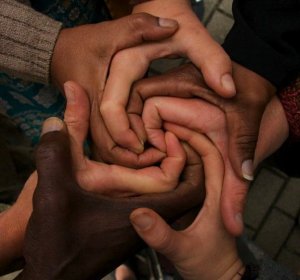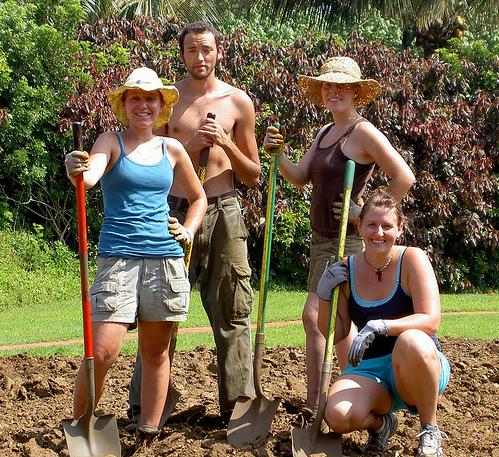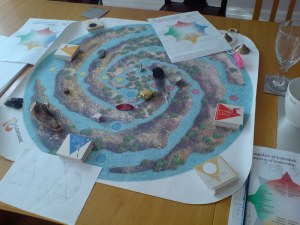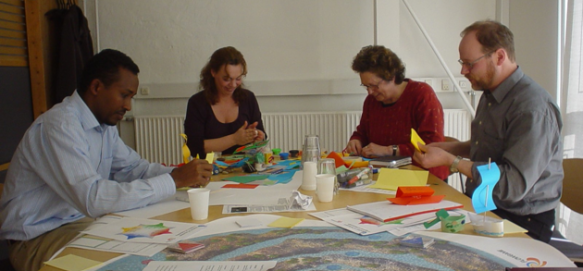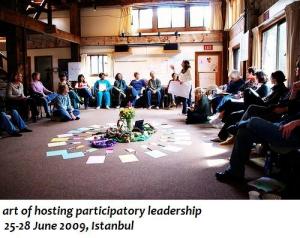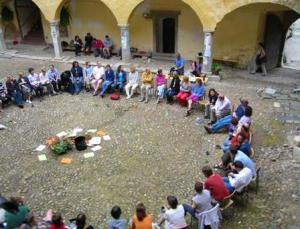I wrote about leadership at times of chaos and complexity in my previous post and finished it with “There are many art forms and practices that enable us to hear the call of the World at this time and lift us to the resonance of the wholeness. I’ll write more about that soon…”
This post is a continuation of the same topic. and I want to write about one of these art forms of human communication, a practice called “Circle” or “Council”. Years ago, when I spent three months volunteering at a learning center called “The Shire” in Nova Scotia, Canada, I had the chance to meet Christina Baldwin who with her partner Ann Linea brought back this ancient art form back to our lives, families, organizations. Here is my interview with Christina about the circle…
The very first time I sat in a circle, as an intentional way of council circle practice, is very significant in my life as it shifted my sense of being with myself and people to a very different level. I cannot remember what the calling question was but what I clearly remember is this feeling of having found something that I have been looking for a long time…It was such a profound experience that it set me on a journey which took me all the way to where I am right now…
To the Shire…
When I heard that Christina Baldwin was coming to the Shire to join ‘the Art of Hosting’ gathering, my heart skipped a beat…this was the woman who ‘called the circle’, an ancient practice of being together and sharing stories, and offered it to us as a gift, whose life work had touched my life so deeply. When I finally met Christina, what struck me most was her youthful energy and sharp humour. She is a great storyteller who gives her message in a very light-hearted and subtle way.
I really wanted to hear her story with her own words, so I approached her for a hearty conversation. She was kind enough to offer me her time and genuine answers.
While sun shone on us and the breeze danced in our hair, Christina told me how she met the circle. The circle has been always there in everyday life: in the school, in the playground, whenever people were together sharing stories. During early years of her career when she was teaching the art of journal writing, Christina instinctively invited participants to form a circle in her workshops, to meet them as peers and to create a better learning space. Circle appeared as a natural form for people to meet in conversations, meetings, workshops. When Christina met her partner Ann who is a naturalist and teacher of outdoors skills in 1991, the two explored how ‘the circle’ can be developed further as a container in everyday life where people can meet each other at a different level, share their stories and be heard. So the ancient practice of gathering around the fire has been reintroduced by Christina in her groundbreaking book “Calling the Circle” as an intentional form of being together, talking and listening, sharing stories.
What did circle mean to Christina, I pondered…What was the magic in it?
It is the core of my being, she says…where the human and the sacred meet each other…where people become God to each other…because the circle slows us down, slow to the point of listening and speaking consciously. The circle teaches us the impact of our words and actions. It is a container for healing, to pay attention and to come back in good space with each other…
Giving birth to something is never painless, so I asked what challenges she faced in circle work. When Christina started working with the circle practice in early 90’s, to her surprise, ‘new age’ people resisted the form, claiming that they knew it all and they did not need any structure, principles or guidelines to be with each other. On the other hand, in work places, organizations and corporations, the rigid hierarchies didn’t allow ‘the magic’ of the circle, people at the top did not want to listen to the people at the bottom…and the challenges changed with time, explained Christina. With today’s fast business and competitive market, people feel more insecure about their positions; fear of loosing their jobs is a shadow in the circle practice.
Naturally I wanted to know the secrets of this role model that allowed her to be more courageous in her work and her life. Without hesitating, ‘spirit’ said Christina. Her belief to be here for a spiritual purpose; to contribute to human goodness. Her love and despair for the humanity…Love, having the right partner and a solid circle of friends…her love for the earth…”I love the world” she said softly and shared another secret for her wellbeing to continue the good work; sitting in the hot tub every night with her partner Ann, surrounded by the nature, and praying with gratitude for what she’s been given and has accomplished. Sounded like a wonderful practice to me…
When I asked ‘what the core of her work’ was, Christina explained that it was to help people to go deeper in themselves and elicit the truest story possible and the courage to share it. When that happens, we cannot hate each other, she added. Then she shared with me an extraordinary story known as 1914 Christmas Truce. The so-called “Christmas truce” began on Christmas Eve, December 24, 1914, during World War I, when German troops began decorating the area around their trenches in the region of Ypres, Belgium for Christmas. They began by placing candles on trees, then continued the celebration by singing Christmas carols. The British troops in the trenches across from them responded by singing English carols. The two sides continued by shouting holiday greetings to each other. Soon thereafter, there were calls for visits across the “No Man’s Land”, where small gifts were exchanged — whisky, cigars, and the like. The artillery in the region fell silent that night. The truce spread to other areas of the lines, and there is a perhaps mythical story of a football match between the opposing forces, which ended when the ball struck a strand of barbed wire and deflated.
In many sectors, the truce lasted through Christmas night, but in some areas, it continued until New Year’s Day.
It is this kind of stories of human goodness, courage, heartfullness and compassion that Christina wants to make sure, are not forgotten, so the humanity does not loose its voice. Sitting in a circle, people drop their facades and just tell the story, their story, that allows them to see each other in a different way and anything is possible from that point on…
Questions are powerful. I wanted to hear Christina’s ‘questions’. One question she asks herself often is ‘what is really trying to happen here?’; she finds it useful to contemplate on in many situations. The other question she keeps is ‘Can knowing our story save the world?’
Lastly, I wanted to know her impressions of the Shire. ‘There is a timeless quality to this kind of dream’ she said. There is something very organic about this space, according to her, and we are in an experiment to listen to it…There is tremendous good heart to work together, as she observed and then suggested the more we can be colleagues to each other and know each other, the better the experiment will be.
It was uplifting to meet Christina, to listen to her ‘story’ and share my story with her. I feel grateful for having hosted her lighthearted and tender presence at the Shire…
THANK YOU Christina!


